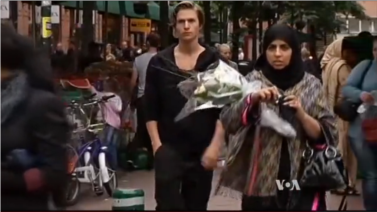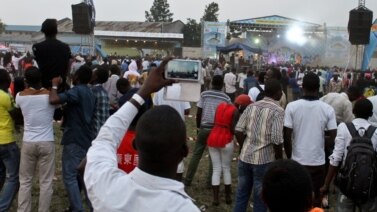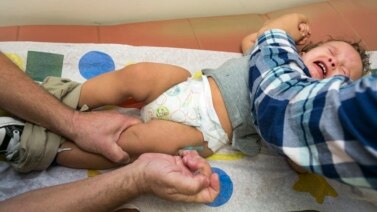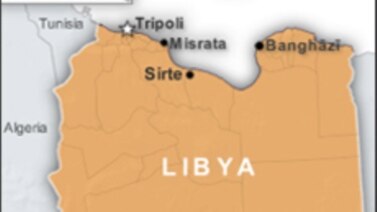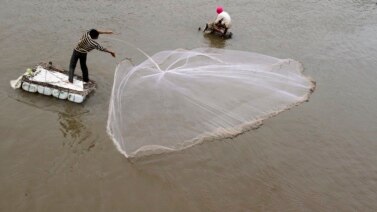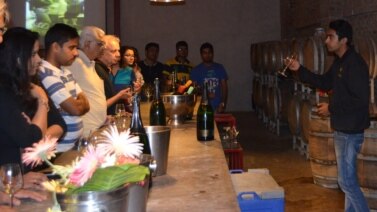NARRATOR: The first thing Than Than remembers about America is the weather.
THAN THAN: “It was really cold. I never feel cold like this before. I was like ‘Mom, my head is on ice.’”
NARRATOR: Than Than was born in a refugee camp in Thailand. She belongs to a persecuted minority group called Karen. The Karen people come from Myanmar, the country formerly known as Burma. Hundreds of thousands of Karen have left Myanmar to escape an ethnic conflict that started more than 60 years ago. Many live just inside the Thai border in camps like this one, called Mae La. Than Than’s family came to America five years ago, when she was just 12 years old. Their new home is Philadelphia, America’s fifth largest city.
THAN THAN: “It was like I was moving to another world. It was really difficult”
NARRATOR: Every year, hundreds of refugees are resettled in Philadelphia, also known as the “City of Brotherly Love.” Many refugees expect to see the glamorous America they see in the media—a land of big cars, big houses, and easy money.
Melissa Fogg is an immigrant mental health specialist at Lutheran Children and Family Services.
FOGG: “Every refugee we see has a big adjustment in terms of what they expected to see in the United States and the reality of their living situation.
WALINSKI: “You have no idea where you’re going. You know you’re going to the United States, but in terms of what city, you could find out like two days before. ‘Oh, I’m going to Philadelphia. Where is Philadelphia? What does that mean?’”
NARRATOR: For many in Philadelphia’s refugee community, it means loneliness and frustrated dreams. Refugees are often placed in some of the toughest neighborhoods in South Philadelphia. Their children are easy targets for bullying in one of America’s most troubled public school systems. Few have experienced cold weather or lived in large cities. Ms. Fogg works closely with refugees in South Philadelphia.
FOGG: “This is a tough neighborhood. Even though it does a great deal of Southeast Asian immigrants in the neighborhood and refugees, it’s a traditionally African-American neighborhood, before that an Irish and Italian-American neighborhood. So it has this history of immigration, but at the same time there are a lot of tensions between the different immigrant groups there.”
NARRATOR: Southeast by Southeast is a community center for refugees in South Philadelphia. Melissa Fogg and Shira Walinsky started the space three years ago.
WALINKSY: “The purpose of this center and this whole project is really celebrating community assets. Instead of thinking, oh if you come here as a refugee, you have a deficit, but more celebrating what you do have. So language, food, culture, actually they’re parts of your identity. And to celebrate them gives you a sense of continuum.”
NARRATOR: Most refugees come to America with little or no English language skills. The city does offer some translation services so refugees can get public assistance. Southeast by Southeast offers English classes that focus on practical life skills.
FOGG: “In our ESL classes we practice going to the store, going to the library, how to talk to your teacher, how to ask for a doctor’s appointment. Things that really help people get through the day-to-day stuff.”
NARRATOR: In most cases, the younger the refugee, the better the English he or she will speak. Their parents, on the other hand, often give up on the language.
THAN THAN: “It’s like really difficult for them to learn and then they forget it easily…. Like sometimes we have to go the doctor, they will ask me to take them there.”
WALINSKY: “The power situation shifts, where because kids might know the language, learn English a little bit easier, they might be the ones translating for the parents, so it’s actually a lot of responsibility for kids.”
NARRATOR: Learning English is a struggle for seniors.
SENIORS: “I study English. Learning English is important.”
NARRATOR: Many can speak only a few words of English, even after years in the U.S. Older refugees have difficulty learning English around younger people. For this reason, the center has a special English class for seniors.
STUDENT: Yangon, Bangkok, Taipei.
FOGG: Ooh, long, long, long, long time.
STUDENT: Far away
FOGG: Far away
TEACHER: Niece
STUDENT: Niece
TEACHER: Niece, nephew
STUDENT: Nephew
TEACHER: Do you have any nieces or nephews?
STUDENT: Yes
FOGG: 7,8,9,10,11,12 grandchildren. 12?
NARRATOR: Fogg says re-establishing traditions from the old country helps give refugees a sense of purpose. These refugees from Iraq are celebrating the Muslim holiday of Eid. This woman, Htoo Ree, was a master weaver in Myanmar before she fled. Southeast By Southeast sponsored a class to teach sewing skills to refugees. Htoo Ree has restarted her textile business with her daughter and granddaughter in America.
NARRATOR: Refugee mental health specialists say it is important for refugees to feel a connection to the urban environment. The partnership with Philadelphia’s Mural Arts Program encourages refugees to paint murals that tell their stories.
FOGG: “In pretty much all of the murals you’ll see a mountain and some jungles representing where families came from before. …All of the murals sort of touch on the idea of losing the nature and the environment that you were in and coming into a whole new place.”
NARRATOR: Philadelphia has thousands of empty lots where buildings once stood. Neighbors and refugee settlement agencies have cleaned up some of these unused spaces and turned them into gardens.
FOGG: “They can grow vegetables and plants from their homeland and use it in cooking. It’s also just a nice green space in a very urban environment.
We believe in a wellness-based model, where if someone is not empowered to learn English, not empowered to do their homework, not empowered to connect with their community, they won’t survive and they won’t thrive in a new city.”
THAN THAN: “I like coming here because, like, it’s like a family home too... If I’m really stressed or something, when I come in here there was always like a teacher. They are always like making us smile, making us work hard.”
NARRATOR: And with enough smiles and hard work, Philadelphia’s refugees may find brotherhood in the City of Brotherly Love.
You can learn more about Southeast By Southeast at http://www.culturalcommunities.org/
This story was written and produced for VOA Learning English by Adam Brock. Chris Cruise was the narrator. Hai Do was the editor.
Words in This Story
adjustment - n. a change that makes it possible for a person to do better or work better in a new situation
loneliness - n. a sadness from being apart from other people
frustrated - adj. very angry, discouraged, or upset because of being unable to do or complete something
continuum - n. a range or series of things that are slightly different from each other and that exist between two different possibilities
assistance - n. the act of helping or assisting someone : help or support
a sense of purpose - the quality of having a definite purpose or value
